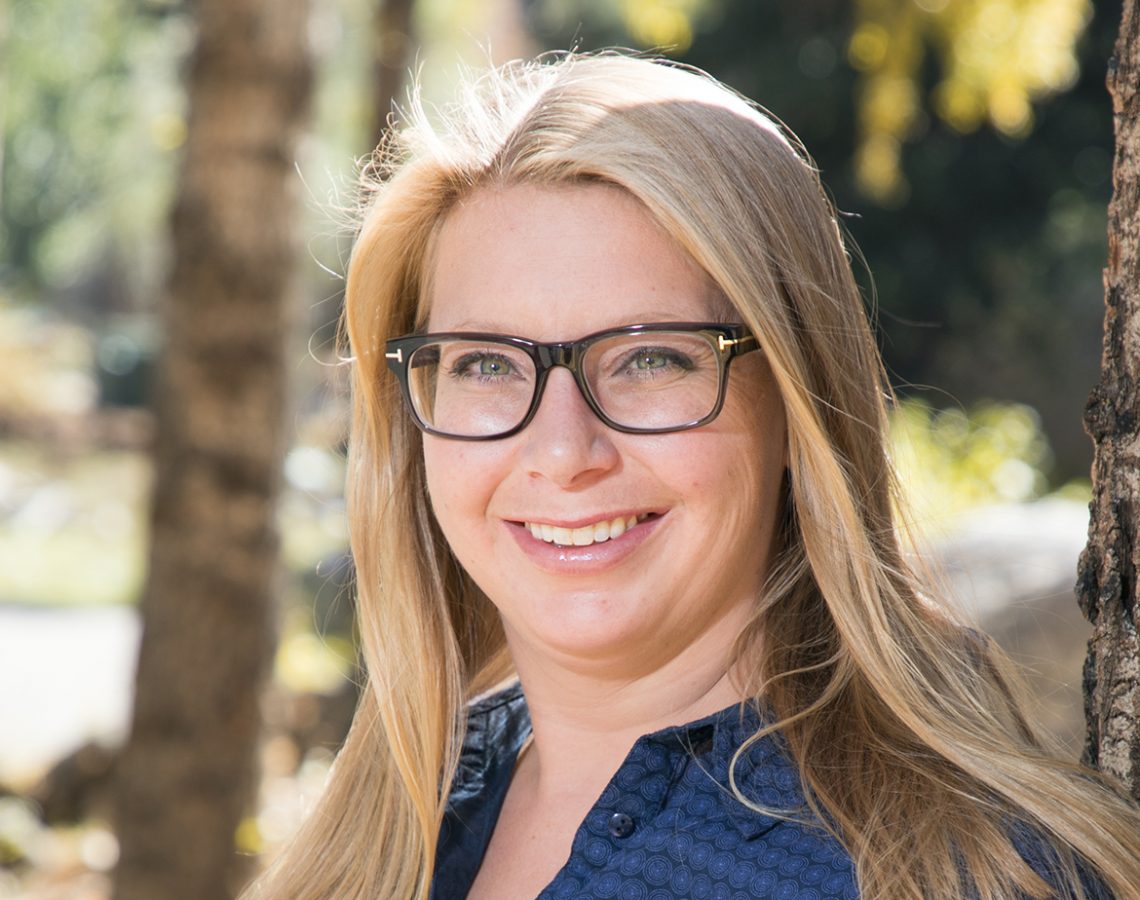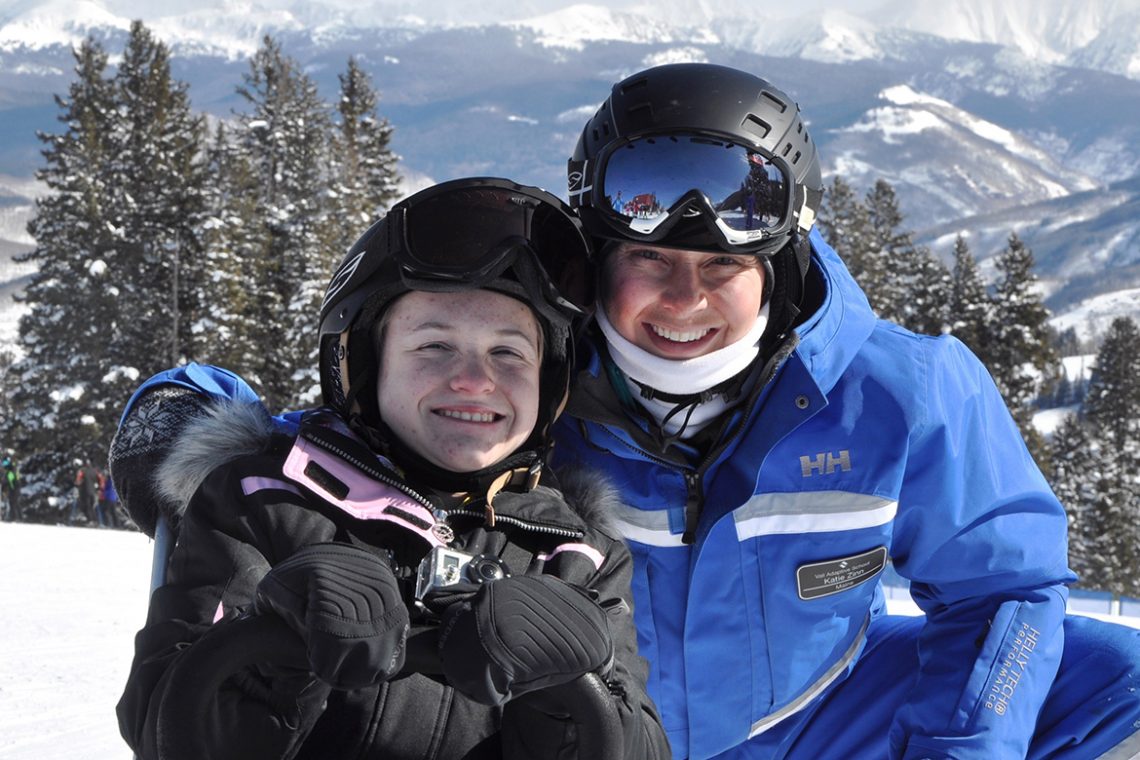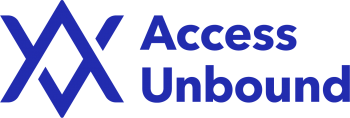As founder and executive director of Access Unbound, Katie Zinn ’06 helps provide people with disabilities the resources needed to access adaptive skiing at Vail Ski Resort.
By Marc Glass, December 2018
In her 2016 TED Talk “How to gain control of your free time,” time-management guru Laura Vanderkam shares a seminal bit of advice about our lives and our moments — and what we do with these finite, precious resources:
“We don’t build the lives we want by saving time,” Vanderkam explains. “We build the lives we want, and then time saves itself.”
It’s appears to be advice Katie Zinn ’06 has taken to heart in building a varied and rewarding life around three engaging endeavors: founding and serving as executive director of the Vail-based nonprofit Access Unbound, teaching people with disabilities to ski as a Vail Resorts Certified Instructor, and being a barista at Vail Village Starbucks. (More on how being a barista strategically complements Zinn’s role as executive director in a moment.)

“My sense of purpose is really built around empowering and inspiring other people,” says Zinn ’06. “When I don’t have the opportunity to have that immediate contact with people, when I’m not seeing that I’m making a difference — seeing the smiles, the impact, and the positive outcomes — I miss it a great deal.”
“There’s no concept of work-life balance in my life,” says Zinn, who was a volunteer instructor with Maine Adaptive Sports & Recreation for three years while she was at UMF and more recently founded Access Unbound to provide people with disabilities the financial resources needed to access adaptive skiing instruction and equipment at Vail. “I’m a full-time instructor. I teach 100 to 120 days a season in varying capacities, whether it’s as a trainer or as an instructor or as an examiner. And then there’s my work with Access Unbound. So, yes, there’s no balance. But that’s always been who I am — always empowering other people and helping people maximize their potential and their abilities.”
In this installment of the Q&A series “Ask Me Another,” Zinn explains the genesis of Access Unbound, how the fast-growing nonprofit helps instructors and students alike, and why — 17 years on — teaching people with disabilities how to ski remains essential to her happiness.
What led you to found and now lead Access Unbound?
“Our mission at Access Unbound is to empower independence by connecting people with disabilities to world-class recreational instruction. This is my seventh season at Vail. In my first year, I worked with a little boy who was five at the time. He had a lot of physical and cognitive delays and spoke only about 10 words. Over the three days I worked with him on skis, his vocabulary doubled. So something good happened here for him. The next year, his family could only afford for him to do one day of lessons. About the same time, I began working with an older person who suffered a traumatic brain injury in a biking accident. He had been very successful in his career, but now can’t ski without an instructor. I had done a lot of days of lessons with him and told him about my concern about people with disabilities who couldn’t afford access to skiing. He said everybody who needs it should have access to the same level of instruction and support he could afford. I had completed a certificate program in nonprofit management at Duke University and was at a point in my life where I was trying to figure out what to do next. He and that little boy were my inspiration to start Access Unbound as a 501(c)(3).”

Zinn, who was an instructor with Maine Adaptive Sports & Recreation in Newry while she was a student at UMF, is now a Vail Resorts certified instructor, teaching people with disabilities to ski using adaptive equipment.
How exactly do you help people through Access Unbound?
“We actually have a three-prong mission. The first and biggest one is our student scholarship program, which provides people with disabilities the funding needed to access the sport, including instruction and equipment, which are very expensive. In our first season, we supported six people with scholarships. In our second season, we supported 22 people for about 60 days. Last season we supported 62 people for 161 days.”
And what are the other two prongs?
“We also have an instructor incentive program that we launched this year. Basically, we’re trying to help incentivize the instructional staff at Vail and Beaver Creek resorts to do continuing education work, increase their certification, and get more training. The resorts are supportive of continuing education, but we now have an honorarium stipend that instructors can apply for that will help cover loss of wages for training days and days they have to take off for exams. We’re trying to help build instructional capacity that way. These folks aren’t making a lot of money and they live in a place where the cost of living is obscene. Every little bit of support helps. The third prong involves equipment. With adaptive equipment, the costs are huge. The least expensive sit-ski is about $5,000 and some of the racing models can be as much as $20,000. We budget funds to purchase equipment and let instructional programs use it. This approach helps programs build capacity and makes sure instructors have access to all of the equipment that they need for people, including our scholarship recipients.”
And where do you get the funding to provide scholarships?
“A huge percentage of my time as executive director is dedicated to fundraising. We’ve had some success with grants, but the majority of our funding comes from individual donors. We’re growing exponentially every year. Last year, we spent approximately $40,000 on scholarships. We’re expecting to spend double that this year.”
So in addition to serving as the chief fundraiser and executive director for a nonprofit, you’re also continuing to instruct — upwards of 100 days a season. Why do you continue to spend so much time on the hill, helping students with disabilities?
“My sense of purpose is really built around empowering and inspiring other people. When I don’t have the opportunity to have that immediate contact with people, when I’m not seeing that I’m making a difference — seeing the smiles, the impact, and the positive outcomes — I miss it a great deal. Through skiing, many of my clients have found identities beyond being ‘a person with a disability.’ I once worked with a former professional rugby player who lost a leg to bone cancer. At the end of one day, he was in tears. He said, ‘I never thought I could participate in a sport again, let alone one with my girlfriend and be on the same trails with her. You’ve given me my life back.’ That’s why I keep doing it.”
And then there’s working as a barista at Starbucks. How does that work with everything else you have going on?
“A while back I read the book It’s Not About the Coffee: Lessons on Putting People First from a Life at Starbucks, and I thought, ‘Oh my gosh, this is such a cool company, I want to work here.’ Believe it or not, with everything else I do, I just wanted a fun job. And as it turns out, it’s where I’ve met a lot of people who have vacation homes in Vail and have become donors to Access Unbound. Working there has created this great, unintended side effect. Because customers know that I disappear in the winter, they’ll sometimes ask, ‘Where’d you go?’ and I say, ‘I work at Vail. I’m a trainer and instructor for the adaptive program, and I also have a nonprofit.’ When they hear that, they’ll often say, ‘That’s so cool! I’d love to meet with you about that.’ And I’ll say, ‘Awesome. Let’s talk.’”


